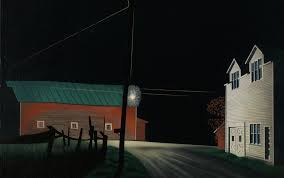Embracing the Enchantment of the Night

The Enchantment of the Night
As the sun dips below the horizon and darkness blankets the world, a transformation occurs. The hustle and bustle of the day give way to a sense of calm and mystery that only the night can bring. The night, with its veil of shadows and twinkling stars, holds a special allure that has captivated humanity for centuries.
A Time for Reflection
For many, the night is a time for introspection and contemplation. The stillness of the night allows thoughts to wander freely, unburdened by the distractions of daylight. It is a time to reflect on the events of the day, make plans for tomorrow, or simply appreciate the beauty of the present moment.
The Night Sky
One of the most enchanting aspects of the night is the sky above. On a clear night, millions of stars twinkle overhead, creating a breathtaking display that has inspired poets, artists, and dreamers throughout history. The moon, with its ever-changing phases, adds to the celestial spectacle, casting a soft glow over everything it touches.
Night Creatures
As humans retreat to their homes and beds, another world awakens in the darkness. Night creatures such as owls, bats, and crickets emerge from their daytime hiding spots to hunt, sing, and play. Their calls and rustlings add an eerie soundtrack to the night’s symphony, reminding us that we share our world with creatures both seen and unseen.
Romance and Mystery
The night has long been associated with romance and mystery. Underneath the cover of darkness, secrets are whispered, stolen kisses exchanged, and love blooms in unexpected places. The cloak of night also lends an air of mystery to everyday surroundings, transforming familiar landscapes into enchanted realms waiting to be explored.
A Time for Adventure
For some, the night is a time for adventure and excitement. Night owls revel in exploring city streets bathed in neon lights or embarking on spontaneous road trips under a blanket of stars. The darkness holds endless possibilities for those who dare to venture out into its embrace.
In Conclusion
Whether you see it as a time for reflection or adventure, romance or mystery, there’s no denying that there is something truly magical about the night. So next time darkness falls outside your window, take a moment to step outside and immerse yourself in its enchanting embrace.
Nighttime Mysteries: Exploring Start Times, Dark Skies, Nocturnal Life, Sleep Effects, and Cultural Beliefs
- What time does night officially start?
- Why is the sky dark at night?
- What are some common nocturnal animals?
- How does lack of sleep affect our health?
- Are there any cultural beliefs or superstitions associated with nighttime?
What time does night officially start?
The official start of night, known as astronomical twilight, occurs when the sun is 18 degrees below the horizon. This marks the point when the sky becomes significantly darker, and stars begin to appear. It is important to note that the exact time when night officially starts can vary depending on factors such as location, time of year, and atmospheric conditions. However, this transition from dusk to night typically occurs around 30 to 60 minutes after sunset.
Why is the sky dark at night?
The question of why the sky is dark at night may seem simple at first glance, but its answer delves into the depths of our understanding of the universe. The darkness of the night sky is a result of the vastness of space and the finite speed of light. Despite countless stars and galaxies scattered across the cosmos, their light can only reach us from a limited distance due to the finite age of the universe. Beyond this observable universe lies darkness, creating an illusion that space stretches infinitely into a void. This phenomenon, known as Olbers’ paradox, challenges our perception of an eternal and unchanging universe and invites us to ponder the mysteries hidden within the vast expanse of space.
What are some common nocturnal animals?
Various fascinating nocturnal animals roam the night, showcasing their unique adaptations for thriving in the darkness. Some common nocturnal creatures include the elusive owl, known for its silent flight and keen hunting skills under the moonlit sky. Bats, with their echolocation abilities, gracefully navigate through the night to catch insects on the wing. The elusive fox emerges from its den to prowl under the cover of darkness, while the agile raccoon scavenges for food in urban areas when most are fast asleep. These creatures and many more exemplify the diverse and intriguing world of nocturnal animals that bring life to the night.
How does lack of sleep affect our health?
The impact of sleep deprivation on our health is profound and far-reaching. Consistent lack of sleep can lead to a range of health issues, including weakened immune function, increased risk of chronic conditions such as heart disease and diabetes, cognitive impairment, mood disturbances, and even weight gain. Sleep is essential for the body to repair and rejuvenate itself, so when we don’t get enough rest, our overall well-being suffers. It’s crucial to prioritize quality sleep as a key component of maintaining optimal health and vitality.
Are there any cultural beliefs or superstitions associated with nighttime?
Throughout history and across cultures, nighttime has been steeped in various cultural beliefs and superstitions. In many traditions, the night is seen as a time when spirits roam freely, leading to practices like lighting candles to guide lost souls or ward off evil spirits. Some cultures believe that certain activities should be avoided at night to prevent bad luck or misfortune. Additionally, the stars and moon have often been associated with divination and spiritual guidance, with rituals performed under their watchful gaze. The night holds a mystical allure that has inspired countless tales and customs, shaping our perceptions and behaviors even in modern times.
